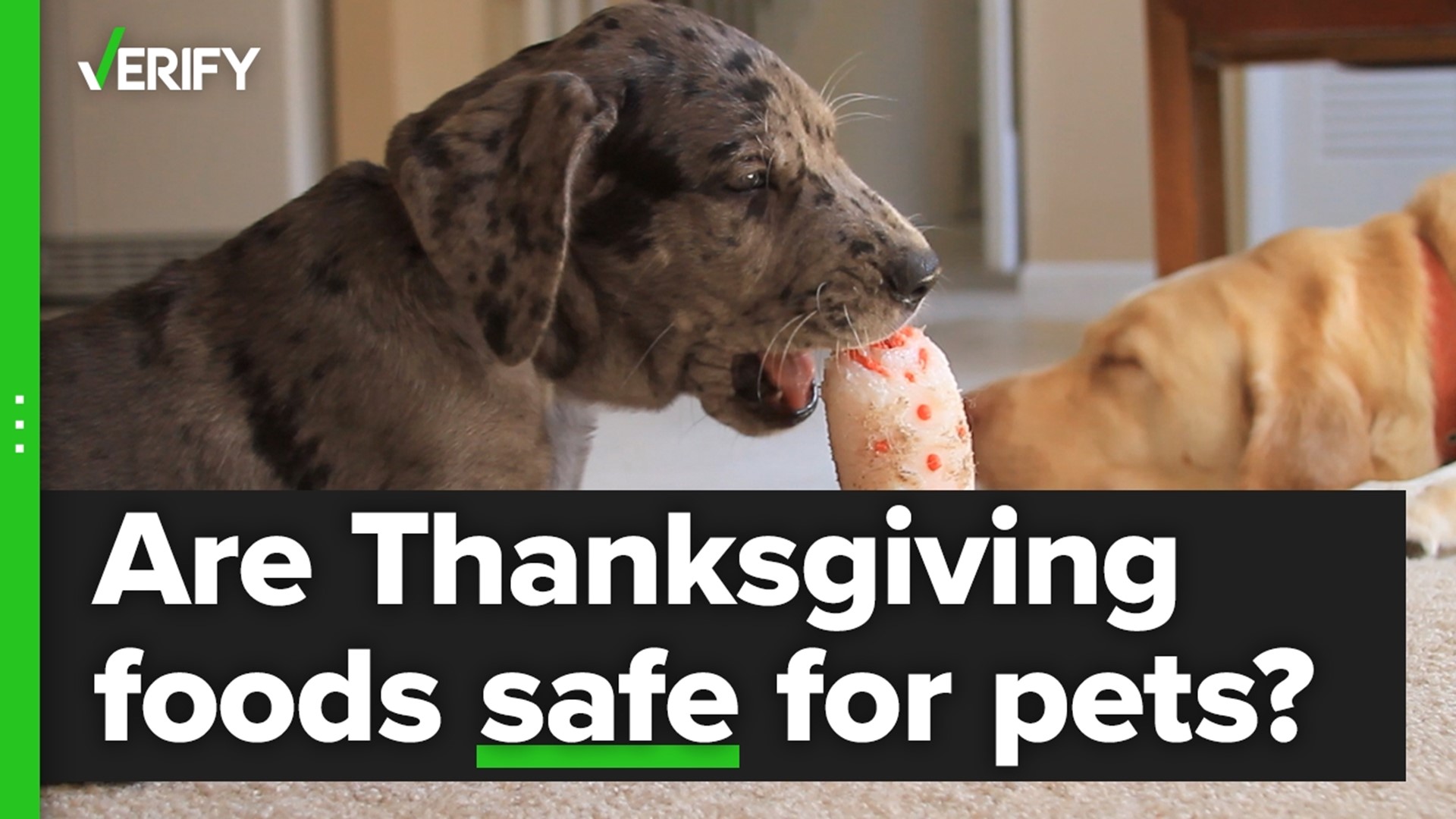Pets often involve themselves in Thanksgiving festivities – whether their owners intend for them to or not.
But not all Thanksgiving food is good for your cat or dog. It’s important pet owners know what can be toxic and what’s safe before offering an extra treat beneath the table.
VERIFY breaks down what you need to know about the safety of the most popular Thanksgiving foods.
THE SOURCES
WHAT WE FOUND
1. Is leftover Thanksgiving turkey safe for pets?
THE ANSWER
“The short answer is ‘yes and no,’” the American Kennel Club (AKC) says on whether dogs can eat turkey. Turkey is often used in commercial dog food and has many nutrients for dogs when cooked plain.
“Thanksgiving turkeys, however, are rarely cooked plain… To us, this is delicious,” the AKC says. “For our dogs, it is a recipe for unpleasant digestive upset at best, and pancreatitis at worst.”
Much of this is the same for cats, according to Michelson Found Animals. It says turkey skin, fat and bones are particularly dangerous for both cats and dogs, and could cause damage to your pets’ digestive systems.
That’s why the American Veterinary Medical Association (AVMA) cautions against feeding your pets any turkey, including small amounts, and most anything else you may eat during Thanksgiving festivities.
“If you want to share a Thanksgiving treat with your pet, make or buy a treat that is made just for them,” the AVMA says.
2. Is it safe for pets to eat ham or other fatty food?
THE ANSWER
Too much fat puts pets at risk of pancreatitis. That means holiday ham, bacon, butter, gravy or meat scraps are not safe for pets.
Pancreatitis is an inflammation of the pancreas that can result in vomiting, diarrhea, loss of appetite and abdominal pain for your pet, the Pet Poison Helpline explains. The symptoms may not show up immediately and can occur up to four days after exposure.
A different Pet Poison Helpline page says pancreatitis can be fatal, and even small amounts of fatty foods can lead to gastroenteritis, a milder condition that causes vomiting or diarrhea.
The AKC says ham contains a higher fat content than most other types of meat, meaning it should be avoided as much as other fatty foods. Ham is also often high in salt and sugar, according to Purina, another reason it’s bad for pets.
3. Are foods with spices and seasonings safe for pets?
THE ANSWER
Many holiday seasonings, spices and ingredients are bad for, and even toxic to, cats and dogs.
Onions, garlic and chives — all common ingredients in stuffing — are poisonous to both cats and dogs, according to the Pet Poison Helpline. Although, the ASPCA says cats are more sensitive to these vegetables than most dog breeds. Both the ASPCA and the Pet Poison Helpline say this family of vegetables can cause gastrointestinal problems and anemia, and can also damage your pets’ red blood cells.
Salt and pepper are also bad for pets, and high amounts of them can lead to salt poisoning. The Merck Veterinary Manual says the most obvious symptom is excessive thirst, but it can also result in vomiting within hours of ingestion and can progress to weakness, diarrhea, muscle tremors and seizures.
The dairy present in foods is a bigger problem for cats than dogs. PetMD says most cats become lactose intolerant after weaning, but the AKC says only some dogs are lactose intolerant. Even if your dog isn’t lactose intolerant, it probably shouldn’t have more than a little milk.
4. Are fruitcakes and other holiday desserts safe for pets?
THE ANSWER
Most holiday desserts use ingredients that are dangerous for pets.
Fruitcakes often include nuts and raisins, both of which are dangerous for cats and dogs.
The AKC says macadamia nuts are some of the most poisonous foods for dogs and can affect their nervous systems, leave them unable to walk and can induce lethargy. The Pet Poison Helpline points out other nuts are high in fat, meaning they can cause pancreatitis. Nuts can also cause blockages in cat intestines because cats cannot readily digest nuts, PetMD says.
Grapes and raisins can cause kidney failure in dogs, the ASPCA says, although the exact toxic substance within these fruits is unknown. PetMD says grapes and raisins are also highly toxic to cats.
Sugar isn’t good for pets, and chocolate is well-known for being toxic to dogs. But even sugar-free sweets pose a danger to pets. The AVMA says xylitol, an artificial sweetener commonly used in gum and sugar-free pastries, can be deadly to cats and dogs alike. The ASPCA says it can lead to liver failure.
5. Are there any plain foods that are safe for pets?
THE ANSWER
Some plain foods often served during the holiday season are safe for pets to eat.
Apples, green beans, sweet potatoes, zucchini, winter squash, carrots and popcorn are all on the Pet Poison Helpline’s list of pet-safe foods. Purina adds cranberries, pumpkin, mashed potatoes and plain turkey meat — as mentioned above — to that list.
It’s important to stress that these foods must be free of oil, butter, fats, sugars, spices, seasonings and salt. Make sure you’re not feeding them canned goods or items that contain potentially harmful ingredients, and feed them exactly as veterinary experts direct.
Michelson Found Animals adds that vegetables shouldn’t make up more than 10% of your dog’s daily diet. So you should only feed your dog vegetables as treats.
The safest way to treat your pet during any holiday, however, is to share some treats or a holiday-themed toy.

